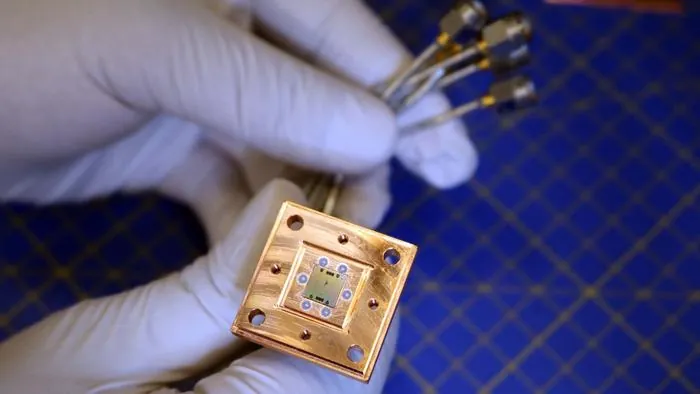
Revolutionary Quantum Refrigerator Cools Superconducting Qubits to Unprecedented Low Temperatures – A Game-Changer for Quantum Computing!
2025-01-09
Author: Jia
Groundbreaking Advancement in Quantum Technology
In a groundbreaking advancement in quantum technology, researchers from Chalmers University of Technology in Sweden and the University of Maryland in the United States have unveiled a revolutionary autonomous quantum refrigerator. This innovative device is capable of cooling superconducting qubits to record-low temperatures, thus significantly enhancing the reliability of quantum computation.
Operating without the need for external controls, the new refrigerator utilizes ambient heat to achieve astounding qubit ground-state probabilities of 99.97%. This remarkable improvement paves the way for error-free quantum computing, addressing one of the significant challenges that has hampered the progress of quantum technologies.
Paradigm Shift in Computational Capabilities
Quantum computers represent a paradigm shift in computational capabilities, potentially transforming numerous sectors, including medicine, energy, encryption, artificial intelligence, and logistics. Unlike classical computers, which process information in binary (0s and 1s), quantum computers utilize qubits that can exist in multiple states at once, thanks to a phenomenon known as superposition. This ability allows quantum computers to perform multiple calculations in parallel, thereby exponentially increasing their computational power.
Challenges in Quantum Computing
However, the efficacy of quantum computers is severely limited by their sensitivity to environmental interactions, which can induce errors. "Qubits are incredibly susceptible to their surroundings; even the faintest electromagnetic interference can cause them to flip values randomly, resulting in significant computational errors," explains Aamir Ali, a quantum technology research specialist at Chalmers University.
Breaking Barriers in Cooling Technology
Traditional cooling systems, known as dilution refrigerators, are typically used to bring qubits to temperatures around 50 millikelvin above absolute zero—still far from the optimal conditions required for stable quantum operations. The new autonomous quantum refrigerator emerges as a complementary technology to these systems, reaching a remarkable cooling capacity of 22 millikelvin.
This leap in cooling efficiency is crucial because superconducting qubits need to be lowered to their ground state (the lowest energy level) to function correctly. The researchers' findings, documented in the esteemed journal *Nature Physics*, highlight the autonomous refrigerator as a vital component in the future of reliable quantum computations.
"By achieving a 99.97% probability for qubits to be in the ground state, we significantly surpass previous cooling techniques, which achieved probabilities ranging from 99.8% to 99.92%," says Ali. While this may seem like a minuscule improvement, the cumulative effect over many computations can lead to substantial increases in the performance and efficiency of quantum computers.
Harnessing Environmental Energy for Cooling
The brilliance of the quantum refrigerator lies in its design. It operates on the principles of thermodynamic interactions between several qubits. One qubit is kept in a warmer thermal environment, establishing a 'hot bath.' Energy from this hot bath is transferred to one qubit of the refrigerator, which subsequently extracts heat from the target qubit being cooled into another, 'cold' qubit, effectively releasing that heat to a colder environment.
"This method shows an impressive synergy between qubits and demonstrates that leveraging environmental heat can yield better cooling outcomes than previously thought possible," stated Nicole Yunger Halpern, a physicist at NIST and adjunct assistant professor at the University of Maryland.
Significance of Autonomous Design
The autonomous design of the refrigerator marks a significant step in quantum engineering. Once initiated, it operates independently, tapping into the natural temperature gradients of its environment, which is a remarkable departure from conventional methods that require constant human intervention.
"Arguably, this is the first practical demonstration of a quantum thermal machine that autonomously performs meaningful industry-relevant tasks," adds Simone Gasparinetti, an associate professor at Chalmers University. Initially intended as a proof-of-concept, the refrigerator's actual performance exceeded expectations, signaling an exciting future for quantum technology.
Looking Ahead
As researchers continue to unravel the mysteries of quantum computing, innovations like the autonomous quantum refrigerator are paving the way for a new era of computational possibilities. This development not only enhances the performance of quantum computers but also brings them closer to real-world applications that could transform industries. The implications are staggering—stay tuned as we unveil more updates from the world of quantum innovation!
 Brasil (PT)
Brasil (PT)
 Canada (EN)
Canada (EN)
 Chile (ES)
Chile (ES)
 Česko (CS)
Česko (CS)
 대한민국 (KO)
대한민국 (KO)
 España (ES)
España (ES)
 France (FR)
France (FR)
 Hong Kong (EN)
Hong Kong (EN)
 Italia (IT)
Italia (IT)
 日本 (JA)
日本 (JA)
 Magyarország (HU)
Magyarország (HU)
 Norge (NO)
Norge (NO)
 Polska (PL)
Polska (PL)
 Schweiz (DE)
Schweiz (DE)
 Singapore (EN)
Singapore (EN)
 Sverige (SV)
Sverige (SV)
 Suomi (FI)
Suomi (FI)
 Türkiye (TR)
Türkiye (TR)
 الإمارات العربية المتحدة (AR)
الإمارات العربية المتحدة (AR)